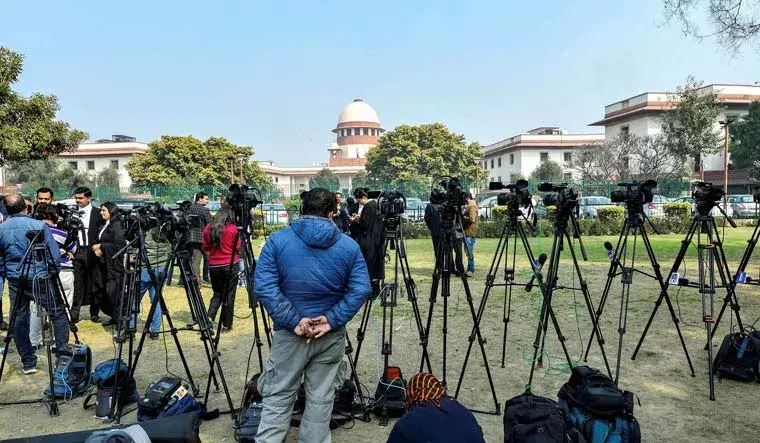Pathbreaking Ruling by SC Restores Some Dignity to a Flailing Media
Pathbreaking Ruling by SC Restores Some Dignity to a Flailing Media

“An independent press is vital for the robust functioning of a Democratic Republic.” The Supreme Court has struck down government orders revoking the license of MediaOne tv channel with solid observations about the freedom of the press. But even as true journalists across the country embrace the judges and the verdict, there is a certain sadness that in 75 years the situation has degenerated to a point where the apex court has to intervene, and reiterate what were the known fundamentals of Indian journalism and democracy.
In an environment where money bags have bought the soul of journalism — very apparent on flashing TV screens with committed anchors manipulating news on a daily basis– those seeking to report with some level of honesty and courage have faced the brunt of court cases, arrests, closures, intimidation. The struggle has been hard and rough as journalists find themselves out on the streets, fighting motivated cases, seeking bail from FIRs filed at the drop of a hat, with the future as bleak as it had appeared bright when they entered the profession years ago.
The judgement lifting the telecast on MediaOne, has made some extremely important points that should help give independent media the space it was being squeezed out of. A bench of Chief Justice D.Y Chandrachud and Justice Hima Kohli has made five extremely important points in the ruling delivered a day ago.
One, the Bench has questioned the government’s usage of ‘national security’ as a pretext, without informing the aggrieved litigant about the reasons behind the contested action. National security has become a password for arrests, and harsh action as in this case with the license revoked. In the face of such a charge the targeted party often feels helpless to counter charges.
The Bench under the CJI has now observed, “the state is using national security as a tool to deny citizens remedies provided under the law. This is not compatible with the rule of law.” The judgement decried the use of ‘sealed envelopes’ submitted to the court (in this case the High Court) by the government pointing out that this restricted the core principles of natural justice as the litigant had no idea about the rationale of the decision that violated her rights.
“The mere involvement of issues concerning national security would not preclude the state’s duty to act fairly. If the state discards its duty to act fairly, then it must be justified before the Court and the facts of the case. Firstly, the state must satisfy the court that national security concerns are involved,” the bench observed. And added ,” the state is using national security as a tool to deny citizens remedies that are provided under the law. That is not compatible with the rule of law.”
Two, the court has made clear what independent journalists have been reiterating for a while without much success unfortunately. That bringing ‘truth to power’ cannot become the basis for action against the media as this would have a chilling effect on free speech and pose a danger to democracy, the Bench observed.
In fact as all journalists who were trained by professional editors during and before the 1990s were told over and over again that the newspaper is not an extension of any government’s propaganda machinery, but that the media was in place to question the government, to raise issues, and to bring the voices of the people to the corridors of power.
The judgement has made it clear that critical views in the media about the government could not be termed ‘anti establishment’ and added, “the use of such terminology in itself represents an expectation that the Press must support the establishment.”
Three, the SC judgement has emphasised the need for an independent media for the “robust functioning of a democratic republic.” In an important assertion the ruling has held up the freedom of the press and the need for it to bring out the hard facts as part of an effort to strengthen democracy, and not weaken it as is being claimed by some.
The judgement states, “Its (media) role in a democratic society is crucial for it shines a light on the functioning of the state. The Press has a duty to…present citizens with hard facts enabling them to make choices that propel democracy in the right direction. The restriction on the freedom of the Press compels citizens to think along the same tangent. A homogenized view on issues that range from socio-economic polity to political ideologies would pose grave dangers to democracy.”
In simple language, through this path breaking ruling the Supreme Court has upheld the freedom of the press in no uncertain way. It has:
- accorded protection to journalists from being arrested under ‘sealed envelope’ charges;
-.placed the onus on the government and the authorities to explain the violation, if any, of national security by journalists or media houses meriting action saying that the state must satisfy the court that such violations have indeed taken place;
- decried the ‘chilling effect’ that comes for such harsh action that subdues free speech and hence poses a danger to democracy;
- underlined the need for a free and independent media in a democracy, as a watchdog and an effective messenger; equated robust media with a robust democracy;
- underlined the necessity for a free space for the media to operate effectively from, and that criticism should not be denounced as anti-establishment but as the real work of the media;



